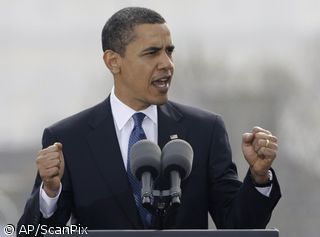For several years the position of Polish exporters on the markets of the former Commonwealth of Independent States has been clearly weakening
Published:
5 May 2003 y., Monday
In order to spur on trade, presentations of Polish exporters are gaining popularity. One such presentation is the Polish National Exhibition in St. Petersburg.
Geographic proximity, relatively small competition from local manufacturers who are not capable of satisfying the growing demand for modern products and, contrary to common belief, the increasingly wealthy and demanding customer, are the advantages of the "eastern market." Why then does trade with the countries of the Commonwealth of Independent States (CIS) constitute as little as 7.1 percent of the global value of Polish export?
The position of Polish companies is weakened by competition from the Western businesses that are perfectly aware of the perspectives which an active and strategically planned entry into Eastern markets can accomplish. Entrepreneurs from Germany, France and the United States, supported by the appropriate funds, first promote and then successfully sell their products in Russia and Ukraine or make direct investments there.
The decrease in the amount of Polish agriculture and food products exported to Eastern markets has stemmed from the fact that big international concerns such as Nestlé, Danone or Unilever directly entered this strategic area. However, the issue of Western competition is only a part of the answer to this question and the possibility of development for Polish exporters on the markets in the former Soviet Union.
One of the most serious difficulties Polish companies encounter is a considerable risk connected with signing commercial contacts with partners from the East who frequently appear to be insolvent and do not honor their contracts. According to Robert Stawski from the Promotion Chamber of the Polish Chamber of Commerce, businesspeople from Russia frequently do not understand the term "advance payment" and sometimes want to pay for the products only after they sell them. For obvious reasons, these terms are hard to accept for Polish manufacturers, which are mostly small and medium-sized companies. The state does not guarantee any protection for companies against situations in which partners from Russia, Belarus or Ukraine do not fulfill the terms of a commercial contract.
Šaltinis:
warsawvoice.pl
Copying, publishing, announcing any information from the News.lt portal without written permission of News.lt editorial office is prohibited.
The most popular articles
 On August 4, the first chartered flight of "The Japan Airlines" will arrive from Tokyo in the Baltic States and land in Riga.
more »
On August 4, the first chartered flight of "The Japan Airlines" will arrive from Tokyo in the Baltic States and land in Riga.
more »
 1.6 billion rouble loan to overcome problems holding up expansion of city of Surgut
more »
1.6 billion rouble loan to overcome problems holding up expansion of city of Surgut
more »
 Nordic Shared Services & Outsourcing Forum 2009, 26 – 27 August, Sweden
more »
Nordic Shared Services & Outsourcing Forum 2009, 26 – 27 August, Sweden
more »
 Results of the latest price survey by Eurostat show that Lithuania is on the list of the TOP 10 least expensive countries in Europe.
more »
Results of the latest price survey by Eurostat show that Lithuania is on the list of the TOP 10 least expensive countries in Europe.
more »
 The European Commission's Digital Competitiveness report published today shows that Europe's digital sector has made strong progress since 2005.
more »
The European Commission's Digital Competitiveness report published today shows that Europe's digital sector has made strong progress since 2005.
more »
 US President Barack Obama said that the economy was weaker than he thought when he took office, but there are signs of improvement.
more »
US President Barack Obama said that the economy was weaker than he thought when he took office, but there are signs of improvement.
more »
 The EIB and UniCredit Group strengthen their cooperation to implement the Joint Action Plan of the largest multilateral lenders in Central and Eastern Europe who have committed to provide up to EUR 24.5 bn lending to the SME sector hit by the global economic crisis.
more »
The EIB and UniCredit Group strengthen their cooperation to implement the Joint Action Plan of the largest multilateral lenders in Central and Eastern Europe who have committed to provide up to EUR 24.5 bn lending to the SME sector hit by the global economic crisis.
more »
 Within the first half of 2009, AB Bank SNORAS earned LTL 24 million of unaudited profit.
more »
Within the first half of 2009, AB Bank SNORAS earned LTL 24 million of unaudited profit.
more »
 10,000 workers were helped by the European Globalisation Adjustment Fund (EGF) last year and of these, more than two-thirds found a new job, according to a report adopted by the European Commission today.
more »
10,000 workers were helped by the European Globalisation Adjustment Fund (EGF) last year and of these, more than two-thirds found a new job, according to a report adopted by the European Commission today.
more »
 SEB recently won awards for best consumer Internet banks in Lithuania and Latvia in a ranking presented by Global Finance Magazine.
more »
SEB recently won awards for best consumer Internet banks in Lithuania and Latvia in a ranking presented by Global Finance Magazine.
more »